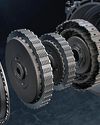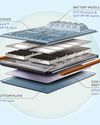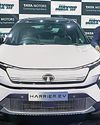
"With EVs it is not a technology problem, but more of an affordability problem," says Carlos Tavares, the global CEO of Stellantis, the world's fifth largest automaker. The company is planning to address that challenge for Europe by exporting cars from India - which it considers as amongst the best cost bases in the world. Speaking to a select set of Indian media Tavares said, "So far Europe is unable to make affordable EVs. Hence there is a big opportunity for India to be able to sell EV compact cars at an affordable price, protecting profitability. Because the country has such a cost competitive supplier base, it is possible."
First visit to India In his first visit to the country after taking charge of Stellantis, Tavares spent over 48 hours reviewing the Indian operation and gauging the cost and quality of its first compact car from Citroen - the C3 out of its Thiruvallur plant on the outskirts of Chennai.
He said that at present, the conventional ICE hatchback in Europe costs between 15,000 to 20,000 euros and the EV is available at almost 40-50 percent premium at 30,000 euros. "If EVs are bought only by a few wealthy people, then the volumes will be limited and it will have a marginal impact on the environment," he said. "How to make EVs affordable to the middle-class is the biggest challenge. Only affordability can create scale, and then only can one have a significant impact on the environment," he opined. Exporting from places like India could be an alternative, the company is exploring.
Esta historia es de la edición 1st December 2022 de Autocar Professional.
Comience su prueba gratuita de Magzter GOLD de 7 días para acceder a miles de historias premium seleccionadas y a más de 9,000 revistas y periódicos.
Ya eres suscriptor ? Conectar
Esta historia es de la edición 1st December 2022 de Autocar Professional.
Comience su prueba gratuita de Magzter GOLD de 7 días para acceder a miles de historias premium seleccionadas y a más de 9,000 revistas y periódicos.
Ya eres suscriptor? Conectar

Spain's Fersa Group invests in India-based Delux Bearings
Besides theRs100 croreinvestment, the Indian company gets access toadvanced technologies and bearings with arange of applications that willhelpinits global growth strategy, writes Manobhava Baruah.

Tata Autocomp to open compact dual-clutch transmission plant
Amidthe country’s growing need for personal mobility with easy manoeuvrability, comes the demand for vehicles with automatic transmission. Tata AutoCompisready tomovein writes Shruti Mishra.

Pankaj Munjal-backed Hero Motors raises equity from GEF Cap
The company willinvest Rs1,500 crore over thenextthree years andit expects 60 percent ofits turnover to come fromelectric vehicle parts. Itaims to becomea Global EV Solutions Company from India

New age thermoplastics for next-generation EV batteries
Saudi-based global materials major SABIChas developed cutting edgein fire-resistant polymers and flame-retardant materials that comply with various EV battery safety standards across the world.

Switch Mobility to meet growing e-bus demand with fresh capex
Oncourse for abillion-dollar business, the company is exploringa possibility of operating satellite factories across the country to serve different geographies, write ShahkarAbidi and Ketan Thakkar.

Kia India to invest Rs 2,000 crore in EVS, to introduce new e-RV in 2025
New investmentto drive R&D, infrastructure development and manufacturing capabilities. The company willlocally produce EVsin India with possibility of exports as well, writes Mayank Dhingra.

"The government has given enough time for indigenisation but the industry has not taken it seriously"
Amitabh Saran, Founder and CEO, Altigreen, shares his views on problems inthe EV industry and battery localisation solutions with Amit Vijay M.

TATA MOTORS SEES ONE INTWO CARS SOLDAS EVS BY 2030
The company aims to offer wider choices withnew EVs that may straddle a pricebracket of Rs20to 40lakhinthe coming years, writes Ketan Thakkar.

MG Motor India in expansion drive, to invest $100 million
The investment willbe usedtoramp up existing production capacity from1.2to1.4-15lakh units per annum atthe automaker's Halol plantin Gujarat, writes Ketan Thakkar.

"Technology and its multiplier effect are driving business transformations and customer experiences"
Technical Centre India is one of Continental’s largest research and development centres in the world, andasa Centre of Competence’ it also develops customised products for the BRIC countries.